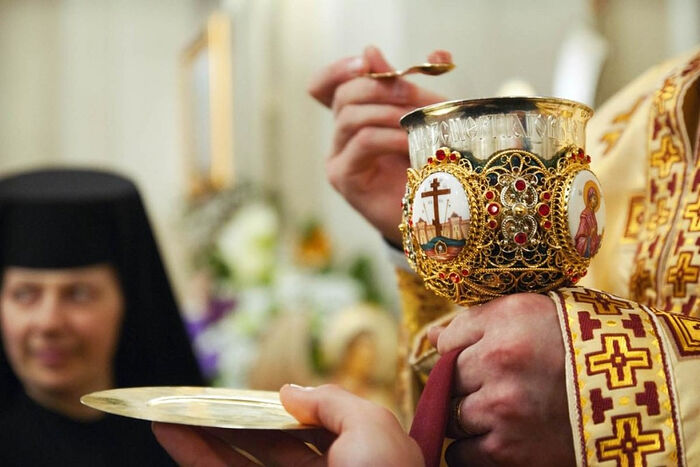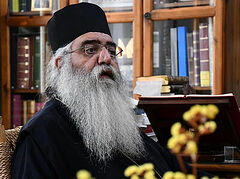Cologne, July 6, 2021
At its most recent session in Cologne on June 23, the Assembly of Canonical Orthodox Bishops of Germany issued a statement on “The Holy Eucharist During the Corona Crisis.”
The meeting was held at the headquarters of the Antiochian Orthodox Metropolis of Germany and Central Europe, with the participation of representatives of the Antiochian, Serbian, Romanian, and Greek Churches.
The statement, published on the Assembly’s Facebook page, begins by emphasizing that the crisis affects Church life just as much as the economic and social life, with the celebration of the Divine Liturgy and other services being “severely restricted and even endangered.”
Thus, the Assembly “would like to point out the unbroken importance of the Eucharist and the Eucharistic community of the faithful for Church life and to point out possibilities that can help their communities and faithful to deal with the current situation.”
The Eucharist is central to and has many meanings for Church life, the bishops write. Holy Communion is understood as both a meal, and more deeply, a Mystery, serving for both the communion of the Holy Spirit unto eternal life and the building up of communion between Christians themselves. Thus, the Eucharist preserves and manifests the unity of the Church.
The bishops also remind that the Eucharist is the central act of thanksgiving for Orthodox Christians, and act of remembrance, manifesting Christ’s very presence.
The Assembly then points to “some aspects of responsible action from a Christian point of view.” Christians are called to love their neighbor, which “is manifested in the ministry to the sick, in prayer for the deceased, in the comfort of the suffering and the bereaved, and in concern for the health of all, including through the observance of hygiene measures. Participation in Christ in the Eucharist is so central to us that we must do everything we can to do justice to it as well as to the health and integrity of our sisters and brothers.”
As for the legal situation, the bishops emphasize the right of religious freedom, but also note that religious rights can be “partially and temporarily restricted” in the event of an “infection of national significance.” The cooperation of Church and state is not in any way un-Orthodox, the bishops write, but they also expect the state to enact reasonable measures, in dialogue with religious authorities.
Concerning the public perception of the Orthodox Church, the Assembly states that “The eternal responsibility of the Orthodox Bishops, but also the responsibility of each individual Orthodox Christian, is, among other things, to ensure that the Orthodox Church and its faithful do their part for the good of society.”
The Church can employ both strictness and leniency (akrivia and economia) in its pastoral mission of leading people to salvation. “Through this principle, exceptions to the rule can and may be made—on the basis of the Gospel and the tradition of the Church—if this is necessary according to the respective circumstances or contributes to the salvation of the individual person,” the Assembly writes.
While the theology of the Eucharist can never change, the means of distributing can and has changed, the bishops write. For instance, while frequent Communion is the norm today, this has certainly not always been the case, as the Assembly points out. Likewise, communing with a spoon has not always been the case, and thus “it would be inappropriate to dogmatize the use of the spoon,” the German bishops believe.
“On the other hand, this practice of communion has proven itself in the Orthodox Church for almost a thousand years,” they add.
The present pandemic has forced hierarchs to consider alternative forms of communing the faithful. Any decision must be guided by the tradition of and decisions of the Holy Synod of the respective Local Church, as well as the requirements of local authorities.
Given the pandemic situation and the legal requirements, the bishops call on people not to judge and condemn the decisions of bishops made according to economia.
In conclusion, the Assembly notes that all forms of health are important, though “the present crisis is particularly painful because the health of the body often seems to be imposed at the expense of other important ‘health’ aspects, such as spiritual or mental health.”
Thus, the hierarchs call on all to pray for those who are sick and those who have already reposed, and for all people to experience God’s wisdom and strength in this trying situation.
Finally, the Assembly writes:
Man remains in life as in death related to Christ, our Lord and Master. So let us love God and each other more these days, let us recognize the value of the things we have taken for granted in our lives. To be able to go to the Liturgy every week, to receive the precious gifts and to see members of our Church, with whom we form the one Body of Christ, has always been important to us; but only now, when we can no longer do this without hindrance, do we realize the true value of the Liturgy.
Follow us on Facebook, Twitter, Vkontakte, Telegram, WhatsApp, MeWe, and Gab!





